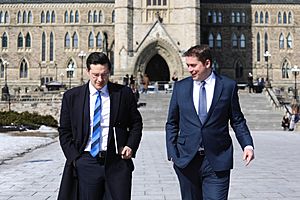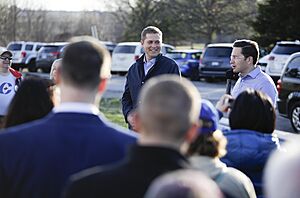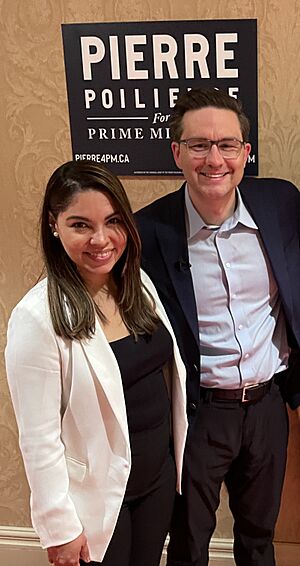Pierre Poilievre facts for kids
Quick facts for kids
Pierre Poilievre
|
|||||||||||||||||||||||||
|---|---|---|---|---|---|---|---|---|---|---|---|---|---|---|---|---|---|---|---|---|---|---|---|---|---|
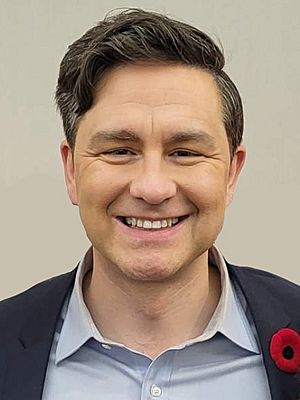
Poilievre in 2023
|
|||||||||||||||||||||||||
| Leader of the Opposition | |||||||||||||||||||||||||
| Assumed office August 18, 2025 |
|||||||||||||||||||||||||
| Deputy |
|
||||||||||||||||||||||||
| Preceded by | Andrew Scheer | ||||||||||||||||||||||||
| In office September 10, 2022 – April 28, 2025 |
|||||||||||||||||||||||||
| Deputy |
|
||||||||||||||||||||||||
| Preceded by | Candice Bergen | ||||||||||||||||||||||||
| Succeeded by | Andrew Scheer | ||||||||||||||||||||||||
| Leader of the Conservative Party | |||||||||||||||||||||||||
| Assumed office September 10, 2022 |
|||||||||||||||||||||||||
| Deputy |
|
||||||||||||||||||||||||
| Preceded by | Candice Bergen (interim) | ||||||||||||||||||||||||
|
|||||||||||||||||||||||||
|
|||||||||||||||||||||||||
|
|||||||||||||||||||||||||
| Member of Parliament | |||||||||||||||||||||||||
| Assumed office August 18, 2025 |
|||||||||||||||||||||||||
| Preceded by | Damien Kurek | ||||||||||||||||||||||||
| Constituency | Battle River—Crowfoot | ||||||||||||||||||||||||
| In office June 28, 2004 – April 28, 2025 |
|||||||||||||||||||||||||
| Preceded by | David Pratt | ||||||||||||||||||||||||
| Succeeded by | Bruce Fanjoy | ||||||||||||||||||||||||
| Constituency | Nepean—Carleton (2004–2015) Carleton (2015–2025) |
||||||||||||||||||||||||
| Personal details | |||||||||||||||||||||||||
| Born |
Pierre Marcel Poilievre
June 3, 1979 Calgary, Alberta, Canada |
||||||||||||||||||||||||
| Political party | Conservative (since 2003) | ||||||||||||||||||||||||
| Other political affiliations |
|
||||||||||||||||||||||||
| Spouse |
Anaida Galindo
(m. 2017) |
||||||||||||||||||||||||
| Children | 2 | ||||||||||||||||||||||||
| Residences | Greely, Ontario, Canada Stornoway |
||||||||||||||||||||||||
| Alma mater | University of Calgary (BA) | ||||||||||||||||||||||||
| Signature | |||||||||||||||||||||||||
Pierre Marcel Poilievre (born June 3, 1979) is a Canadian politician. He has been the leader of the Conservative Party since 2022. He also serves as the Leader of the Official Opposition.
Mr. Poilievre first became a Member of Parliament (MP) in 2004. He represented the area of Carleton until April 2025. After the 2025 federal election, he won a special election in Battle River—Crowfoot on August 18, 2025. He now represents that area.
He grew up in Calgary, Alberta. He later moved to Ottawa to work in politics. From 2006 to 2015, he held important roles in government. He was a minister under Prime Minister Stephen Harper. He focused on making government work better and helping with jobs.
In 2022, Mr. Poilievre became the leader of the Conservative Party. He often talks about economic issues. He wants to make life more affordable for Canadians. His ideas include reducing government spending and cutting some taxes. He also supports energy projects and wants to remove the federal carbon tax.
Contents
His Early Life and Education
Growing Up in Calgary
Pierre Poilievre was born on June 3, 1979, in Calgary, Alberta. He was adopted by two schoolteachers, Marlene and Donald Poilievre. His adoptive father, Donald, is a French-speaking Canadian from Saskatchewan. Pierre and his younger brother, Patrick, grew up in Calgary. They enjoyed playing ice hockey and going on camping trips.
As a child, Pierre delivered newspapers for the Calgary Sun. He went to Henry Wise Wood High School. He was part of the school's wrestling team. At age 14, an injury stopped him from wrestling. He then found a new interest: politics. He started reading political books and learning about government.
Pierre became involved with political parties like the Reform Party. When he was 16, he helped sell party memberships. He also helped with political campaigns by talking to people. At 17, he attended a national political convention. He finished high school in 1997.
University and First Jobs
After high school, Pierre worked for Telus. He also briefly worked as a journalist for a conservative magazine. He studied international relations at the University of Calgary. He earned his bachelor's degree in 2008.
When he was 19, Pierre wrote an essay for a contest. The essay was about his ideas for Canada if he were Prime Minister. He won $10,000 and an internship. He also led a student political club at his university.
Working in Politics Before Becoming an MP
In 2000, Pierre helped with a campaign for Stockwell Day, a political leader. He worked as an advisor for Mr. Day in 2002. During this time, he also continued his university studies online.
In 2003, Pierre started a company with a business partner. They offered services like political communication and research. Soon after, Pierre decided to run for MP himself. He joined the new Conservative Party.
Starting His Political Journey (2004-2013)
First Years as a Member of Parliament
In 2004, at age 24, Pierre Poilievre was elected as an MP. He represented the area of Nepean—Carleton. He was one of the youngest MPs in the House of Commons. The Conservative Party became the Official Opposition at this time.
Mr. Poilievre worked on several issues. He supported the Queensway Carleton Hospital. He wanted to help the hospital with its funding. He introduced a bill to stop the government from charging rent to non-profit hospitals. This bill did not pass, but his efforts helped the hospital pay only $1 in rent each year.
He also proposed ideas to make MPs more accountable. He suggested a way for citizens to remove an MP through a petition. He also proposed a bill about parents' responsibility for their children's actions.
Mr. Poilievre also shared his views on national appointments. He questioned the choice of Michaëlle Jean as Governor General of Canada. He raised concerns about her past political views.
Helping the Prime Minister
Pierre Poilievre was re-elected in 2006. The Conservative Party formed a minority government. Prime Minister Stephen Harper appointed Mr. Poilievre as a Parliamentary Secretary. He worked closely with other ministers. He helped oversee the creation of the Federal Accountability Act. This law aimed to make government more transparent.
He was re-elected again in 2008. He became the Parliamentary Secretary to the Prime Minister. He worked on important national and international issues. He helped address the 2008 financial crisis. He also traveled to Geneva, Switzerland, for a conference on discrimination.
In 2010, an incident occurred where Mr. Poilievre drove through a Parliament Hill gate without permission. He later apologized for this.
He won re-election in 2011. The Conservative Party formed a majority government. He became Parliamentary Secretary to the Minister of Transport. He also worked with the Federal Economic Development Agency for Southern Ontario. He supported ideas to give workers more choices about union payments. He believed this would enhance workers' rights.
Becoming a Cabinet Minister (2013-2015)
Leading Democratic Reforms
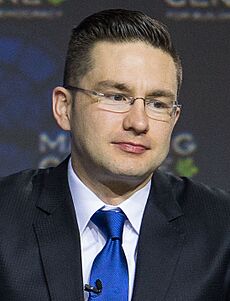
In July 2013, Prime Minister Harper appointed Pierre Poilievre as the Minister of State for Democratic Reform. This was a challenging role. He worked on ideas to improve how Canada's government works. He focused on the Canadian Senate, suggesting ways to make it more accountable.
In 2014, Mr. Poilievre introduced the Fair Elections Act. This law changed how people vote in Canada. It updated the types of identification needed to vote. He also introduced a bill about voting for Canadians living abroad.
Minister for Jobs and Social Programs
In February 2015, Mr. Poilievre became the Minister of Employment and Social Development. He also continued his role in democratic reform. He was responsible for helping Canadians find jobs and supporting social programs. He also oversaw the National Capital Commission.
In July 2015, he announced new support for families. This included an expansion of a child care benefit program. Later, it was noted that this announcement had elements of a political campaign event. He was asked to share information about this on his social media.
In Opposition and Shadow Minister (2015-2022)
Representing Carleton
In 2015, the boundaries of Mr. Poilievre's electoral district changed. He then ran and won the election in the new Carleton riding. The Conservative Party became the Official Opposition to a Liberal government.
Mr. Poilievre took on new roles in the Opposition. He became a "critic" for the Conservative Party. This meant he was responsible for questioning the government on specific topics. He served as a critic for the Treasury Board and for employment issues.
In 2017, he became the critic for the Minister of Finance. He proposed a bill to help people with disabilities by changing tax rules. This bill did not pass. He was re-elected in 2019.
Mr. Poilievre was very active during the WE Charity scandal. He questioned the government about its involvement. He also spoke out against a bill about online streaming. He believed it could limit people's freedom of speech.
Running for Party Leader
In 2021, Mr. Poilievre was re-elected as MP for Carleton. In 2022, the Conservative Party needed a new leader. Mr. Poilievre decided to run for the position. He announced his goal to become Prime Minister.
His campaign focused on making Canada a "freer country." He also promised to address the cost of living. He criticized other candidates in the race. He won the leadership election on September 10, 2022. He won with a large majority of the votes. This made him the leader of the Conservative Party.
Reports later suggested that some foreign agents tried to help his leadership campaign in 2022. Mr. Poilievre said he was not aware of this. He also defended his choice not to get a special security clearance.
Leader of the Conservative Party (Since 2022)
Leading the Opposition
On September 12, 2022, Pierre Poilievre gave his first speech to his team as leader. The next day, he announced his leadership team. This included new deputy leaders, Melissa Lantsman and Tim Uppal. He also named a large "shadow cabinet" to question the government.
In October 2022, the Conservatives supported some government bills. They voted for a bill that helped with the goods and services tax rebate. However, they voted against other bills, like a dental care program for children. They worried these bills would increase inflation.
In November 2022, Mr. Poilievre asked for an audit of government spending during the COVID-19 pandemic. This audit found some issues with payments. In January 2023, he also called for a review of government contracts with a consulting company.
In November 2023, the Conservatives voted against an updated trade agreement with Ukraine. Mr. Poilievre explained his reasons for this decision. On April 30, 2024, he was asked to leave the House of Commons. This happened after he used strong words to describe the Prime Minister.
Reports about foreign interference in Canadian elections also came out in 2024. Mr. Poilievre asked for the names of any MPs involved to be made public. He has chosen not to get a special security clearance. He believes it could limit his ability to speak freely.
Mr. Poilievre has also spoken about other issues. He criticized the Prime Minister for commenting on provincial policies about students. In September 2023, he called both Justin and Pierre Trudeau "Marxists" in a video. He also encouraged Albertans to stay in the Canada Pension Plan.
The 2025 Federal Election
Under Mr. Poilievre's leadership, the Conservatives won several special elections. On June 24, 2024, they won a seat in Toronto—St. Paul's. This was a riding that the Liberal Party had held for a long time. They also won another seat in Cloverdale—Langley City on December 16, 2024.
Opinion polls showed the Conservatives leading the Liberals for a while. However, this changed after Justin Trudeau resigned in January 2025. Mark Carney became the new Liberal leader in March.
On March 23, 2025, Prime Minister Carney called a federal election for April 28. Mr. Poilievre campaigned on reducing income taxes. He also proposed using a special clause in the Charter of Rights and Freedoms.
In the April 28, 2025 election, Mr. Poilievre lost his seat in Carleton. He was defeated by Liberal candidate Bruce Fanjoy. This was a rare event for a major party leader in Canada. He congratulated Prime Minister Carney on the election results.
Returning to Parliament
After the election, a Conservative MP named Damien Kurek resigned his seat. This allowed Mr. Poilievre to run in a special election in Battle River—Crowfoot. Until he won this election, former Conservative leader Andrew Scheer served as the interim Leader of the Opposition.
Mr. Poilievre won the special election on August 18, 2025. This meant he returned to the House of Commons.
Since the election, Mr. Poilievre has spoken about working with the new Liberal government. He said he would look for common ground. He also offered to cooperate on ending a trade dispute with the United States. On June 20, 2025, his party voted to pass a bill to remove trade barriers between provinces.
What Pierre Poilievre Believes In
Pierre Poilievre describes himself as a "true conservative." He is known for focusing on economic issues. He wants Canada to be a country with a lot of economic freedom.
Ideas for the Economy
Mr. Poilievre believes that large government spending causes inflation. He suggests a "pay-as-you-go" rule. This would mean that any new spending must be balanced by cuts elsewhere. He also supports cryptocurrency like Bitcoin. He thinks it can help protect against inflation. He wants Canada to be a leader in digital currency technology.
He has criticized the Bank of Canada for its economic predictions. He believes the bank should be more accountable. He has also said he would cut personal income taxes.
Mr. Poilievre wants more competition in the telecommunications industry. He also supports reducing funding for the Canadian Broadcasting Corporation (CBC). He believes the CBC is biased. He suggests turning CBC buildings into affordable housing.
Jobs and Workers
Mr. Poilievre has supported ideas that give workers more choice about joining unions. He also supported a bill that prevents companies from using replacement workers during strikes. This bill passed in February 2024.
Housing and Building Homes
Mr. Poilievre wants to make housing more affordable. He believes that too much bureaucracy slows down building. He proposes that large cities build more new homes each year. If they meet targets, they would get federal funding. If not, they would receive less.
He also suggests selling off unused government buildings. These could then be turned into affordable housing. In October 2024, he proposed removing the GST on houses under $1 million. He believes this would encourage more home construction.
Environment and Energy Plans
Mr. Poilievre supports addressing climate change with green technology. He wants to reduce carbon emissions without using taxes. He plans to encourage technologies like carbon capture and storage. He also wants to increase the production of electric cars. This would involve more mining for materials like lithium.
He believes Canadian energy is cleaner than energy from other countries. He proposes stopping the import of foreign oil. He also wants to review pipeline projects that were cancelled. He plans to remove the federal carbon tax.
Canada's Place in the World
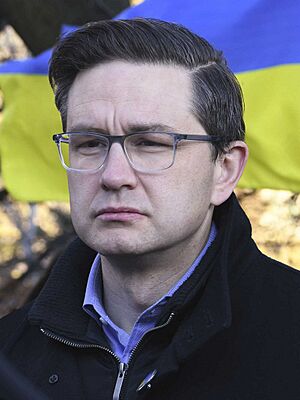
Mr. Poilievre has spoken about foreign interference in Canadian elections. He called for a public registry for foreign agents. He also criticized the government's relationship with China.
In response to the Russian invasion of Ukraine, Mr. Poilievre stated that he would support Ukraine. He wants Canada to send more weapons and help Ukrainian refugees. He also believes Canada should supply Europe with energy. He opposed a trade agreement with Ukraine in 2023, citing concerns about a carbon tax.
Mr. Poilievre said he would ban his Cabinet ministers from participating in the World Economic Forum. He believes the forum does not serve Canada's interests.
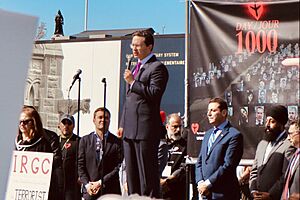
Mr. Poilievre condemned the actions of Hamas during the 2023 Gaza war. He stated that Israel has the right to defend itself. He also said he would reduce foreign aid to some groups. He wants to use that money to strengthen the Canadian Armed Forces.
After Donald Trump won the 2024 US election, Mr. Poilievre called for Canada to respond to new tariffs. He wants to boost Canadian trade with other countries. He uses the phrase "Canada First," similar to a past Canadian Prime Minister.
Other Important Issues
Mr. Poilievre supports freedom of expression. He wants to change laws that he believes limit online speech. He also supports peaceful protests, like the Canada convoy protest. He believes the government should not overuse emergency powers.
He has also shared his views on immigration. He wants to make it easier for families to reunite. He also wants to help skilled immigrants get their professional licenses faster. However, he has also called for reducing the number of new immigrants and asylum seekers. He believes this is important for housing and healthcare.
Mr. Poilievre supports Canada's public healthcare system. He wants to address shortages of doctors and nurses. He proposes making it easier for healthcare professionals to work across provinces. He also supported a bill to end federal COVID-19 vaccine mandates.
He opposes re-establishing a long-gun registry. He also opposes recent bans on certain types of firearms. He believes the focus should be on stopping gun smuggling.
His Family Life
In December 2017, Pierre Poilievre married Anaida Galindo. They had their first child, a daughter, in October 2018. In September 2021, they welcomed their second child, a son.
Mr. Poilievre and his family live in the Stornoway residence. This home is usually for the Leader of the Opposition. Even after the 2025 election, they were allowed to stay there. This was until Mr. Poilievre was re-elected as an MP.
Mr. Poilievre co-owns a company that rents out a condo in Calgary. His wife, Anaida, also owns a rental property in Ottawa. They believe these properties help provide affordable homes for families.
Pierre Poilievre speaks both English and French fluently. His father, Donald, helped him learn and keep his French language skills.
See also
 In Spanish: Pierre Poilievre para niños
In Spanish: Pierre Poilievre para niños
 | Dorothy Vaughan |
 | Charles Henry Turner |
 | Hildrus Poindexter |
 | Henry Cecil McBay |


